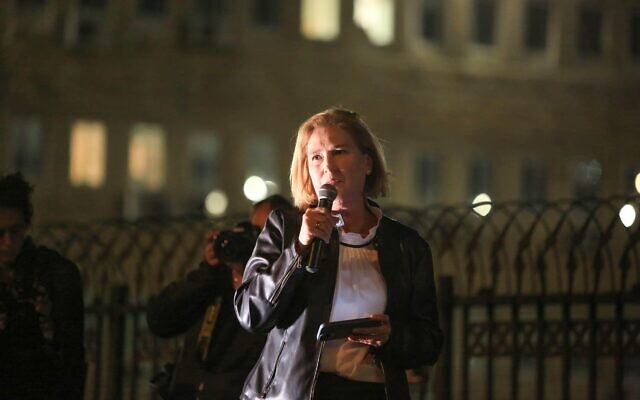INTERVIEW: Tzipi Livni – ‘This is about Israel putting religion before democracy’
Tzipi Livni, who might have been Israeli prime minister, tells Jewish News why she's involved in the massive protests across the country and the conversations we now need

It is not judicial reform. That is not what this is. Even through a screen, you can tell she’s angry. To many British Jews, Tzipi Livni needs no introduction. She is the Israeli politician who, on another day, might have been Israeli prime minister.
Ahead of her visit to London this week, she spoke to Jewish News about Israel’s moment of reckoning, its largest ever street protests now approaching their fourth month with no signs of waning.
One of 21st century Israel’s most recognisable political figures, who was foreign minister before forming her own party, Livni’s words count, which is why she has been addressing tens of thousands in the streets. Just don’t call it ‘judicial reform’…
___
“Israel was born as a Jewish and democratic state, the nation state of the Jewish people, with equal rights to all citizens.” These are the simple yet powerful and altogether fundamental opening words of Tzipi Livni when we speak on Monday.
“For years we lived in harmony, not contradiction. What we’re seeing now is a complete change, with those trying to put the Jewishness of the state above the democratic nature of the state.”
Her warning was issued ahead of an event at London’s JW3, sponsored by Jewish News, during which she is due to talk to former Times and BBC News editor James Harding about the new right-wing Israeli government’s attempts to hobble judges who can currently veto anything unconstitutional.
“It’s connected. The government wants to overrule Supreme Court decisions, to change the balance of power [between government, parliament, and judiciary], and to change the independence of the judicial system in Israel, to take over all of it,” says the 64-year-old, who once also held the post of justice minister.
“The gatekeepers – watchdogs within government, Supreme Court, Attorney-General… they all need complete independence. They need it. So, people are demonstrating. They’re taking to the streets, fighting for democracy, demanding that the government stop. These are dramatic moments in Israel.”
Indeed, they are. Israeli Prime Minister Benjamin Netanyahu appeared to acknowledge as much in recent days by watering down some of the bills’ components and delaying its ratification until 30 April. But this is not about ‘judicial reform’, says Livni.

“It’s about democracy, which is a set of values. It’s not just, ‘majority rules’. Yes, the majority does rule, but under strict conditions, with minority rights and so on.”
What about the elections? Didn’t Israelis vote for this? She thinks, then likens governing to driving. “When you win a majority, it gives you the right to ride, but when you ride, you still have road rules, lanes, signs, lights, traffic police.”
The government, she says, “wants to ride without all this, to take the entire country and change its democratic nature… No election gives you the right to do this. It’s against the system itself”.
Is this not a left-right issue, as right-wingers have depicted? Nonsense, she says. “I cannot accept the idea that democracy is a left-right issue. It’s about the soul of Israel. It’s quite disturbing if people think Israeli democracy belongs only to them.
“When Israel was born, all parts of Israeli society signed up to the Declaration of Independence – ultra-Orthodox, socialists, communists, revisionists, the right-wing… they all agreed that in the State of Israel, there were equal rights without discrimination, freedom of speech, freedom of culture and religion…”
Is she willing to paint a picture of the nightmare scenario? What could a right-wing government with extremist ministers do without having to worry about a newly subservient judiciary? What fires to rights and freedoms could it light?

She isn’t prepared to think in terms of defeat but acknowledges that “the problem isn’t just the bills on the table, or the balance of power… It’s whether we all agree with the fundamental basis of the Declaration of Independence, and there are some parties within this government that simply do not accept equal rights for all citizens”.
Think of the ultra-Orthodox, she says. “Do they recognise equality for women, or equality of burden? They don’t want to serve in the IDF. For them, ‘equal rights’ is not a common denominator. It used to be, but now they’re breaking it. They’re translating the Jewishness of the State of Israel not from a national perspective, but from a religious one.”
Zionism as a national movement helped Israel be accepted and supported by the international community because the Jewish people have the right to a state of their own, she says, “yet there is a group for whom the Supreme Court is a burden, because their vision is about annexation” of the West Bank.
“They live in Judea and Samaria and don’t want to live with equal rights with Palestinians, so they’re trying to erode the nature of Israeli democracy to bring about a one-state reality. On top of this, we have a prime minister who – for his own personal reasons – wants to delegitimise the police, the Attorney-General, the courts, the whole judicial system.”
Livni says ministers who do not accept the Israel’s set of fundamental values or the legitimacy of its judiciary will soon be able to “do whatever they want… that’s why the problem is even bigger than what you see now”.

Livni says Israelis are up-in-arms. “They are on the streets saying, ‘we do not accept it’. In a way, they woke up, a group that was much less active before. It’s amazing. I can see it growing. The first demonstration, it was the regulars. The second, it was different people – religious, moderates.
“I thought, ‘this is different’. They believe in Israel as both Jewish and democratic, they believe people have rights… The very young, very old, children fighting for their future. It’s touching. To be part of it gives hope.”
Were the government to back down over the bills it has already introduced, it would be a victory, but she admits that it would not be enough. The danger would still be there.
“We have to have a new Basic Law,” she explains, “one that adopts the values of the Declaration of Independence. It was clear for decades. It’s not clear now? OK, let’s go back to base and legislate it as a common denominator.
“This is important because it connects not only different parts or ‘tribes’ of Israeli society, it also connects Israel to the Jewish people, to world Jewry. When we say ‘Israel is a Jewish state’ – what does it mean? Mainly it’s an aspiration to us as a people, with equal rights and shared values, so Jews abroad can feel connected to Israel.
“The grandparents cried when Israel was established. The children cried in the Yom Kippur War, when they thought Israel might be no more. Now the grandchildren cry because they feel eliminated.
“Yet, it can be an opportunity, to reconnect the different parts of Israeli society and to reconnect Israel to world Jewry. That’s why this is a very important, dramatic, and historical moment.”

When all is said and done, will anything stop this from happening? A pessimist (certainly one living in the diaspora) may conclude that the Israeli government cares not a hoot about what anyone thinks.
“Oh, they care! Trust me. We took them by surprise. We had some impact, not enough, but we will continue. When Netanyahu was thinking what he’ll do in government, it didn’t include this. He needs to give answers all over the world.
“He doesn’t care about demonstrators, or the opposition, but he does care about his position, about Israel’s economy, about what’s happening in the army, with the fighter pilots – we never anything like that before. So, it’s not just another protest in Israel. It’s something else. It’s about who we are. And, as you saw, they postponed part of the bills already.”
So, what next? At some point soon, there will be judgement day, she says. “Someone will appeal it to the Supreme Court, to ask: is it legal? Is it against our constitutional values?
“If the Supreme Court decides to cancel it, senior government people will need to decide if they abide by the government or by the court. It’s clear they should abide by the court, but it will nevertheless be a constitutional clash.
“This is not ‘judicial reform’. It’s changing the nature of Israel. It’s turning democracy from a set of values into a system of elections. They want to rule without limitation, and we all need to understand it. That’s why people are demonstrating – because they know it’s bigger than just a discussion among lawyers.”
How will it change the relationship with world Jewry? Israelis need to “stop preaching and start listening”, Livni says. “We still say, ‘we are the safe sheltering place from antisemitism, you should contribute or do whatever we ask you to do’. No way!”
The conversation about what it means to be both a Jewish and democratic state was needed even before this, she says. “So, let’s have it. We need these common denominators. ‘Love thy neighbour’ is part of why I’m proud to be a Jew.”
Does she have any final words for diaspora Jews dismayed by what they are seeing? “World Jewry must understand that you can support Israel as a Jewish and democratic state, support equal rights, and criticise Israeli policy.
“It doesn’t mean you’re anti-Israel or antisemitic. It’s legitimate. It’s what we’re doing inside Israel.”
She pauses. “It’s also important for Israelis know that we are not alone when we take to the streets, that our voice is heard, including by the UK Jewish community, and for you to know that we’re fighting for Israel’s democracy. And it’s not over.”

Thank you for helping to make Jewish News the leading source of news and opinion for the UK Jewish community. Today we're asking for your invaluable help to continue putting our community first in everything we do.
For as little as £5 a month you can help sustain the vital work we do in celebrating and standing up for Jewish life in Britain.
Jewish News holds our community together and keeps us connected. Like a synagogue, it’s where people turn to feel part of something bigger. It also proudly shows the rest of Britain the vibrancy and rich culture of modern Jewish life.
You can make a quick and easy one-off or monthly contribution of £5, £10, £20 or any other sum you’re comfortable with.
100% of your donation will help us continue celebrating our community, in all its dynamic diversity...
Engaging
Being a community platform means so much more than producing a newspaper and website. One of our proudest roles is media partnering with our invaluable charities to amplify the outstanding work they do to help us all.
Celebrating
There’s no shortage of oys in the world but Jewish News takes every opportunity to celebrate the joys too, through projects like Night of Heroes, 40 Under 40 and other compelling countdowns that make the community kvell with pride.
Pioneering
In the first collaboration between media outlets from different faiths, Jewish News worked with British Muslim TV and Church Times to produce a list of young activists leading the way on interfaith understanding.
Campaigning
Royal Mail issued a stamp honouring Holocaust hero Sir Nicholas Winton after a Jewish News campaign attracted more than 100,000 backers. Jewish Newsalso produces special editions of the paper highlighting pressing issues including mental health and Holocaust remembrance.
Easy access
In an age when news is readily accessible, Jewish News provides high-quality content free online and offline, removing any financial barriers to connecting people.
Voice of our community to wider society
The Jewish News team regularly appears on TV, radio and on the pages of the national press to comment on stories about the Jewish community. Easy access to the paper on the streets of London also means Jewish News provides an invaluable window into the community for the country at large.
We hope you agree all this is worth preserving.





















